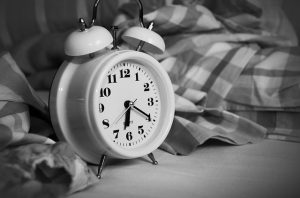Daylight Savings Time Is Not Healthy!
 It is ironic that this week—the week when we are all sleep deprived due to the commencement of Daylight Savings Time – is National Sleep Awareness Week. This year’s theme “Begin with Sleep” highlights the importance of good sleep health for individuals to best achieve their personal, family, and professional goals.
It is ironic that this week—the week when we are all sleep deprived due to the commencement of Daylight Savings Time – is National Sleep Awareness Week. This year’s theme “Begin with Sleep” highlights the importance of good sleep health for individuals to best achieve their personal, family, and professional goals.
Daylight Savings Time has a number of health risks associated with it. In the days after the time change, the risk of heart attack, workplace injury and car accident is higher.
Being tired can decrease productivity, concentration, and general well-being and our appetite regulation is thrown off, causing us to make poor food choices.
In a February 2014 survey from the Better Sleep Council, it took 29 percent of Americans a full week to feel normal again after losing an hour of sleep. Twelve percent forgot to do something important and 5 percent said they acted irrationally. For those who identify as night owls, it could take up to three weeks to adjust to the time change. The National Public Health Institute found that the transition to spring reduced sleep efficiency (how long you spend in bed compared to how long you actually spend sleeping) an average of 10 percent.
How do you minimize the impact of sleep loss and facilitate a quick recovery? Here are some simple ways of making the transition easier:
- Eating a healthy breakfast first thing helps your circadian rhythm adjust faster as “breaking the fast” tells your body it is time to start your day.
- Going for a walk, particularly during daylight hours, helps to adjust your body clock.
- For a few days after the time change, avoid caffeine after 3PM.
- Avoid eating for at least two hours before going to bed.

















